|
Introduction
This match (January 1st - February 17th 1890) was the precursor to a world championship match against Wilhelm Steinitz, it was not, however, a candidates' tournament. The challenger was originally supposed to be the winner of the Game Collection: New York 1889 but there had been no outright winner. 1 Instead, the third place player, Isidor Gunsberg , challenged the tournament's co-winner Mikhail Chigorin . 2 There was little doubt that the winner of this match would be generally considered at Steinitz's legitimate challenger for the world crown. The match was arranged by the Havana Chess Club and played in Havana. It was for ten games up, draws not counting, with stakes of £200 a-side. 3 4 The participants Chigorin
Chigorin (39 y.o.) made his international debut at 2nd DSB Congress, Berlin (1881) , taking 3-4th place, but he made his reputation in London (1883) , in the next six years Mikhail Chigorin only had the opportunity to play a single match (Jules Arnous de Riviere in 1883) but no tournaments. Instead he concentrated on popularising chess in Russia and playing correspondence games. From January 20th to February 24th 1889, Chigorin had fought but lost a world championship match against Wilhelm Steinitz by 10½–6½ (+6-10=1) - Steinitz - Chigorin World Championship Match (1889). Only a few weeks later, on March 29th, he was playing in and then tied for first with Max Weiss in the extremely strong and large New York 1899 tournament. "Chigorin did not have a solid sports background, nor any resounding international victories (except taking fourth place in the London tourney of 1883)... favouring the Russian champion was the incontrovertible fact that thanks to his vehement research, the study of openings had reached a profound height of interest... (he) directed several chess magazines in his native country, and he flooded them with his profuse commentaries..." 5 Chigorin's best results were to come in the 1890s ( see - http://www.edochess.ca/players/p388... ) when regular strong international tournaments became a yearly occurrence rather than once in a decade. He was the third or fourth rated player throughout the 1890s. He tied a match with Tarrasch Chigorin - Tarrasch (1893) and his greatest tournament victory was to come at Budapest (1896) . Gunsberg
Isidor Gunsberg 's career reached its peak at the end of the 1880's, with impressive results in Game Collection: New York 1889 and Manchester (1890) (second behind Tarrasch). He went onto give a good account of himself in the Steinitz - Gunsberg World Championship Match (1890) by 8.5 to 10.5. According to Chessmetrics, he was 2-5th in the world 1886-90. 6; whilst EDO Chess estimates Gunsberg to have been 2nd-7th for the same period. 7 At New York Gunsberg came third. He beat Chigorin 2-0, but lost to Weiss by 0.5 to 1.5. Gunsberg then seized an unexpected and sudden opportunity. With the joint tournament winners Chigorin and Weiss declining to play a match to select a challenger to world champion Steinitz, Gunsberg challenged Chigorin. At the time of the match Gunsberg was 35 year's old, four year's younger than his opponent. Gunsberg had struggled for his place in the limelight. He had never been seen as the preeminent British player and was usually eclipsed by Joseph Blackburne .Gunsberg had emerged in the third German Chess Congress 1883. Gunsberg was 17th with 5/18 whereas Blackburne won with 13.5/18. At the fourth German Chess Congress, Hamburg July 13th - 25th 1885, Blackburne again won on a tie break followed by James Mason. Gunsberg improved his standing to 5th only half a point behind the winner. At Hereford, August 4th – 12th, 1885, Blackburn won and Gunsberg was fifth equal, whilst at the Second BCF championship London 1886, July 12th – 29th, he was third equal with Taubenhaus behind Blackburne and Burn. At the fifth German Chess Congress, Frankfurt July 17th - August 2nd, 1887, Blackburne was fourth and Gunsberg was far back in 14-16th place. He scored only two points against the top ten players. The Third BCF Congress London 1887, November 29th - December 12th, improved his status. Gunsberg was first equal with Burn ahead of Blackburne by 1 1/2 points; and at the Fourth BCF championship in Bradford, August 6th – 18th 1888, Gunsberg won, 1 1/2 points ahead of all his important British rivals including: George Mackenzie, Mason, Amos Burn , Blackburne and Henry Bird. In 1887, Blackburne - Gunsberg (1887), Gunsberg defeated Blackburne in a match , played in Bradford and London, 26th September – 9th November 1887 scoring +5 -2 =6. Having tied for first in 1887 and won the title outright in 1888, and at least temporarily drawn ahead of his most obvious rival, his victory in this match gave him the status as a credible challenger to Steinitz for the world championship. "The difference in style between the two players has been very well brought out in the present match. Gunsberg is impetuous and Blackburne is careful, but both have a wonderful power of combination, and are capable, of very brilliant strokes." 8 Gunsberg's problem was that he was not consistent. At 6th DSB Congress, Breslau (1889) , 15th – 26th July 1889, he was equal fourth, but Tarrasch eclipsed all the other participants with a magnificent +9. At Amsterdam (1889) , 26th August – 1st September 1889, he came only half-way up the field (+2 -2 =4). Background to the match Blackburne had defeated Johannes Zukertort Blackburne - Zukertort (1887) – (7th May – 9th June 1887). It was effectively a match between the second and third players in the world behind Wilhelm Steinitz. Blackburne dominated, winning by 5 to 1 with 8 drawn games "I hear that an effort is being made by the leading members of the British Chess Club to arrange a match between Blackburne and Steinitz. The superiority shown by the former over Zukertort in the match now concluded was so decided that friends of the English champion are convinced that he is able to lower the colours of that redoubtable player." 9 Zukertort died 20 June 1888 (aged 45). The question was now who would be the new Challenger? "There is a pretty firm conviction at the clubs that that Gunsberg, especially since the death of Zukertort, is the strongest and hardiest of the professional masters of the game, and that in his present condition he can be more trusted than anyone else to play up to his best form over a fortnight's course….It will soon be time, by the way, to demand a match between Gunsberg and Steinitz -the old Achilles who sulks on his reputation in America. Mr Steinitz is giving us time enough in England to forget his prowess, and people already say that his victory over Zukertort, when the decline of the doctor's powers had manifestly set in, was not of sufficient importance to provide him with laurels for the remainder of his life. No doubt, this is said partly by way of defiance, and in course of time it is pretty certain that the champion will have to descend into the lists again, and try conclusions with Mr Gunsberg." 10 Steinitz saw Chigorin as his most credible challenger and chose to defend his world championship title against Chigorin in Havana (20th January 1889 - 24th February, 1889). Steinitz defeated his Russian challenger by 10-6, Steinitz - Chigorin World Championship Match (1889) Gunsberg takes his opportunity in New York The Sixth American Chess Congress New York 1889, commenced on Monday, March 29th , 1889 and was originally to allow a fresh challenger for the world championship to emerge. "It is the purpose of the Committee to make the Tournament a contest for the real championship of the world, thus avoiding the controversies and disputes that have so often arisen at the end of tournaments, which, owing to the absence of a regulation providing for a match, have rendered them fallacious tests of superiority. In addition to the First Prize which will be $1,000, minimum, (approx. £22,400 in 2016 value) a trophy representing such championship will be provided and held subject to challenge under fair and equitable conditions, thus combining the advantages of a tournament and a championship match, to consist of at least seven games up, forming part of the tournament, and to be incorporated in the Book of the Congress. 11 "The winner of the Tournament shall be bound to play the Championship Match if duly challenged. He shall not be obliged to play for stakes, but may insist upon a maximum of $1,500 a side. To ensure compliance with this rule, one-fourth of the amount of the First Prize shall be held as a forfeit until the Championship Match is completed or the time for challenge has expired." 12 But whilst Steinitz edited the tournament book and had been one of the principal organizers, he did not choose to play: "In that connection it is due to mention that the non-participation of Mr. Steinitz was a great disappointment to the majority of Chess amateurs. The Committee beg to say on this subject that they would have been highly gratified if Mr. Steinitz had been one of the contestants" 13 Steinitz's explanation was: "I was one of the chief organizers and therefore could not well compete..." 14 Mikhail Chigorin and Max Weiss tied for first with a score of 29 but Chigorin defeated Weiss in their individual game. They then drew all four games of a playoff. "At the end of the tournament there was a tie between M. Chigorin, of St. Petersburg, and Herr Max Weiss, of Vienna. Both these masters expressed a desire not to be compelled to play a championship match, as provided by the rules, and as there was no other challenge for the title and the prizes offered for the purpose, the Committee decided that this contest should not take place." 15 The Committee gave way, probably influenced by the fact that the congress had lost money and subscribers had not paid and spectators were fewer than anticipated. Although Weiss was not interested in playing a championship match, Gunsberg, as the third place finisher, exercised his right and challenged Chigorin to a World Championship candidates match. "7. The right of challenge shall belong to the prize winners in the order of their score" 16 It also buttressed his claim that he had won the tournament's best game prize - Mason vs Gunsberg, 1889 Weiss' reticence may have been due his decision to leave chess for the greater certainty and remuneration of a banking career. He had also just played 49 games including a tied mini-match with Chigorin to try to decide the tie for first place. For Chigorin a match against Gunsberg would be a welcome pay-check and was an offer on the table whereas Steinitz had not made any move to play the winner of New York. "One of the usual results of a great tournament is that after its conclusion various rumours arise of projected matches between the combatants. There is generally a feeling among some of the competitors that they did not do themselves justice, or that they had bad luck in particular games, and there is a desire to prove themselves not inferior to those with whom they had lost. Challenges are therefore issued very freely by the losers, though they are not always accepted by the winners. The New York contest has been no exception to the general custom, and already there are many matches in the air. Gunsberg, who is well known to be one of the most enterprising of chess players, is stated to have challenged Chigorin, and it is anticipated that if he proves victorious he will afterwards play Weiss. A contest between Gunsberg and Burn is also in contemplation. A match between Gunsberg and Chigorin would be of the greatest interest, for these two players are undoubtedly the leading representatives of the modern school. Both are well gifted with imagination, and their games exhibit a boldness and chivalry of style which even if not invariably successful, is always certain, at any rate, to command admiration. Mr. Steinitz's so-called "modern theory," however successful it maybe in his hands, is not of a kind to make chess more popular, nor to excite the admiration of rising players. The style of chess that in our opinion can be justly designated as the "modern school" combines the clash and enterprise of Labourdonnais and Macdonnell with improved scientific accuracy. It is this method that has been successfully adopted by both Gunsberg and Chigorin…" 17 "CHESS CHALLENGES.
Before leaving New York Mr Gunsberg challenged M. Chigorin to a match at chess, if the Russian champion would come to London to play. The contest might be easily arranged. Another match is talked of between Herr Steinitz and Gunsberg, and could the great Bohemian champion be prevailed on to cross the water, this most interesting event might also be negotiated. A set match for the championship of the world was to follow the late New York tournament. "T'were a consummation devoutly to be wished" and nothing would wanting on the part of English amateurs to bring it about." 18 "MATCH BETWEEN GUNSBERG AND CHIGORIN.
Mr. Gunsberg has been challenged (sic), and has accepted the challenge, to play a match against Mr. Chigorin. The following are the conditions : 1. Ten games up, draws not counting. 2. Time limit 15 or 20 moves an hour. 3. Four games a week. 4. Play to commence between the 15th of December and 1st of January next. Chigorin's friends propose a stake of £200, and Gunsberg, who has no wish to play for any heavy amount, is not likely to make any difficulties in matters of detail." 19 "The Havana Chess Club has arranged another great match to take place in "that El Dorado of chess players" between M.Chigorin of St.Petersburg and I.Gunsberg, of London". 20 Gunsberg quickly attracted the financial support from British players: "THE GUNSBERG - CHIGORIN MATCH.
The conditions which Gunsberg proposed to Chigorin in connection with this encounter have been accepted by the latter, and we may therefore look upon the contest as a fixture. As before stated play is to commence in Havana, between the 15th December and 1st January next. A circular has been issued by a committee, acting on behalf of Mr. Gunsberg, in which Chess players of this country are invited to provide the stakes, and give their representative that national support which will enable him to cope successfully with his powerful antagonist in the great struggle for Chess supremacy between England and Russia. The Committee is composed of the following gentlemen: Wordsworth Donisthorpe (Vice President British Chess Club), F. Anger (Vice President City of London Chess Club), J. W. Hunt, M.D. (President North London Chess Club), L. Hoffer (Hon. Sec. British Chess Association), A. Mocatta, A. Hunter, Thos. Schofield, W. Montague Gattie, &c." 21 "CHESS CONTESTS IN HAVANA.
The chess news from Havana is interesting. Extensive preparations are being made for a series of match games between Herren Chigorin and Gunsberg, and an engagement of five weeks has been offered to Capt. Mackenzie to take part in a contemplated tournament. In addition to guaranteeing the passage money from their places of residence in Europe and return, the sum of $250 for hotel expenses will be paid to each on arrival in Havana. In addition, $20 will be paid to the winner and $10 to the loser at the end of every game, and in case of a draw $10 will be paid to each player up to five games. The winner of the ten-game match will also receive a purse of $1,000, this sum having being subscribed by the backers of Herr Chigorin. A similar amount is expected to be raised by the followers of Herr Gunsberg. " 22 "…Mr Gunsberg travelled from London via New York, arriving at Havana about the middle of December. Herr Chigorin left Russia in the latter part of November, and proceeded via Paris to New York, reaching that city on the day of Mr Gunsberg's arrival in Havana. Herr Chigorin completed his journey in time to allow to the playing of the first game of the match on New Year's Day". 23 "Gunsberg arrived at Havana on December 16th, and Chigorin at New York on the same day, having been prevented by a attack of influenza from leaving St.Petersburg till November 24th. After some preliminary play with the Havana players by Gunsberg, the great match began at the Casino Espanol, at 2 p.m., on New Years's Day. Sunday, Tuesday, Wednesday and Friday are the days for play..." 24 Conditions
"Further communication from Senor Adolfo Moliner states that Mr. I. Gunsberg has cabled his acceptance of the offer to play at Havana against Chigorin according to the proposed terms and rules, and that Chigorin, through his representative, Mr. de Beon, accepts also. RULES GOVERNING THE MATCH BETWEEN MESSR. GUNSBERG AND CHIGORIN 1. Ten games up, draws not counting.
2. Time limit, 15 or 20 moves per hour.
3. Four games a week.
4. Play to begin between the 15th Dec. and the 1st of January. 5. Either player to have the right to abstain from play three times during the match, provided he give notice to that effect previous to the time fixed for the beginning of the game. 6. Play begins at 3 p.m. and proceeds up to 6 p.m. It is resumed at 8 p.m, until 11 p.m. During dinner adjournment the two players remain together. 7. The time will be measured by stop- clocks. Either player not appearing, his clock will be set in motion at 3.05 p.m., and should he fail to arrive after two hours he forfeits the game. 8. At any adjournment the first player writes down his move and hands it over in a closed envelope to the Hon. Secretary or to any person appointed for the purpose by the latter. 9. If the same move be repeated six times the opponent may claim a draw. The winner will be he who first scores ten games. 11. The London International Rules of Play will govern the match. 12. Umpires not to be backers of either party, and shall be elected by each, subject to the approval of the other side, and the two players shall elect a Referee. 13. The right of publishing the match games belongs to both players and the club." 25 "It seems that the invitations of the Club to the two Champions include a request that the openings might be varied as much as possible. Clearly they had enough of the monotonous sticking to favourite openings in the Steinitz-Chigorin match. ..." 26 "Mr. Gunsberg has sailed from Liverpool on the Alaska to fulfil his engagement at Havana, where he will fight a match with Chigorin, the Russian player, for the chess championship. The match, which is expected to commence about Christmas, is to be one of 10 games up, draws not counting, stakes £200 a-side, the entertaining club giving in addition a fixed sum to the winner and loser of each game played." 27 "All preliminaries have now been arranged for the chess match Gunsberg versus Chigorin, play in which will be commenced on Wednesday next." 28 "The regular days of play are Tuesday, Wednesday, Friday, and Sunday of each week. The time limit agreed upon requires the completion of 30 moves by each player within the first hour and three-quarters, after which the stipulation is 15 moves per hour." 29 The match was held in the Casino Espinol 30. This was probably the the ‘Casino Espanol' built next to the Havana Yacht Club on the waterfront off Avenida 5ta. It appears to have been abandoned and its main building has now collapsed. The current building known as the 'Casino Espanol', or more recently as the ‘Palacio de los Matrimonios', was built later in 1914. Timetable
Game 1 - January 1st 1890 - Chigorin v Gunsberg
Game 2 - January 3rd 1890 - Gunsberg v Chigorin
Game 3 - January 5th 1890 - Chigorin v Gunsberg
Game 4 - January 7th 1890 - Gunsberg v Chigorin
Game 5 - January 8th 1890 - Chigorin v Gunsberg
Game 6 - January 10th 1890 - Gunsberg v Chigorin
Game 7 - January 12th 1890 - Chigorin v Gunsberg
Game 8 - January 14th 1890 - Gunsberg v Chigorin
Game 9 - January 15th 1890 - Chigorin v Gunsberg
Game 10 - January 18th 1890 - Gunsberg v Chigorin
Game 11 - January 21st 1890 - Chigorin v Gunsberg
Game 12 - January 22nd 1890 - Chigorin v Gunsberg
Game 13 - January 24th 1890 - Gunsberg v Chigorin
Game 14- January 26th 1890 - Chigorin v Gunsberg
Game 15 - January 28th 1890 - Gunsberg v Chigorin
Game 16 - January 31st 1890 - Chigorin v Gunsberg
Game 17 - February 2nd 1890 - Gunsberg v Chigorin
Game 18 - February 4th 1890 - Chigorin v Gunsberg
Game 19 - February 5th 1890 - Gunsberg v Chigorin
Game 20 - February 10th 1890 - Chigorin v Gunsberg
Game 21 - February 12th 1890 - Gunsberg v Chigorin
Game 22 - February 14th 1890 - Chigorin v Gunsberg
Game 23 - February 17th 1890 - Gunsberg v Chigorin The progress of the match Chigorin was White in the even numbered games.
Chigorin - 1 1 0 ½ 0 1 ½ 0 0 0 1 0 0 0 ½ 0 ½ 1 ½ 1 0 1 0 - 9
Gunsberg - 0 0 1 ½ 1 0 ½ 1 1 1 0 1 1 1 ½ 1 ½ 0 ½ 0 1 0 1 - 9
Progressive scores - draws do not count
Chigorin - 1 2 2 2 2 3 3 3 3 3 4 4 5 5 5 6 6 7 7 8 8 9 9
Gunsberg - 0 0 1 1 2 2 2 3 4 5 5 6 6 7 7 7 7 7 7 7 8 8 9
The match rolled heavily one way then the other. Chigorin went two points into the lead, and then lost four in a row from Rounds 7-10.
Chigorin was ahead in seven of the first eight rounds, Gunsberg then took the lead for the next nine rounds. The score was tied at seven wins each at round 18. Chigorin was a point ahead with the last game to play but Gunsberg won the 23rd game and tied the score. Both players were more successful with the Black pieces in this match. Chigorin was the most successful as Black (+6,=1,-4), winning his last four wins with the Black pieces, yet he had a crisis mid-match when from rounds 8-14 he lost four times in a row with Black. Chigorin won three times with White, and lost five times. He lost with White four times in the first nine games. Gunsberg won five games with Black, and four with White (all these wins being in succession from Rounds 8-14). After Round 14 he did not win with White again. Contemporary accounts "THE RIVAL CHESS PLAYERS. FEATURES OF THE MATCH BETWEEN MESSRS. GUNSBERG AND CHIGORIN. HAVANA, JAN. 23. The eleventh game in the championship match was played yesterday, when Mr. Chigorin played the Ponziani Opening, a mode of attack he adopted in the first game of the series. The Russian, as in the first game, obtained an advantage in the opening, which he materially increased by subsequent good play, while in the end game he really surpassed himself, conducting it with great brilliancy, which was much admired by the numerous spectators. Mr. Gunsberg resigned at the v thirty-fourth move, after about three and one-half hours' play. The score now is: Gunsberg, 5 ; Chigorin, 4, and 2 games drawn. The first ten games of the Chess match now being played at Havana have been the subject of much discussion among the Cubans and Chess-players in this country. A summary of these games will therefore be timely. On January 1st, when the champions faced each other for the first time in Havana, both were in excellent health and spirits. It will be remembered that this is Mr. Chigorin's second visit to the famous Cuban Chess centre, while Mr. Gunsberg, in order to thoroughly accustom himself to the climate, arranged to arrive a fort night before his famous antagonist. Mr. Chigorin, in the first encounter, played with all the dash and brilliancy for which he is celebrated, and succeeded in out playing Mr. Gunsberg at every point in the first game, this being a fine specimen of modern Chess and a well-deserved victory. It cannot be said that Mr. Gunsberg overcame the moral effects of a defeat in the second game. His play, although full of line strategy, lacked finish, and again the Russian succeeded in adding another victory to his score by a brilliant combination in the end game. Although Mr. Gunsberg was handicapped in the third game by a slight attack of fever, he scored his first win in spite of having chosen the French game as his defence. Mr. Gunsberg often falls back upon this safe defence, when either wishing to check the victorious career of his antagonist or when feeling out of sorts. If Mr. Gunsberg was beaten in the first and second games, Mr. Chigorin had to put up with a defeat in the third game, for which great credit is due to Mr. Gunsberg, in as much as he entirely outplayed his rival by introducing a novelty which the Russian failed to offset. In the fourth game, a short battle of thirteen moves, neither player had a chance throughout the contest. It was a Four Knights Game, where exchanges were the principal feature, and after a most uneventful and short struggle the first drawn game was recorded.
For the first time in the match the Russian essayed the Evans Gambit in the fifth game. It is a generally acknowledged fact that Mr. Chigorin' ranks among the most renowned masters as an exponent of this mode of attack. Mr Gunsberg conducted the defence very cleverly and ought to have won the game right out, but Mr. Chigorin played the middle game in splendid style and regained the ground lost in the opening. Mr. Gunsberg, however, was equal to the occasion, and when it looked as if honours would be divided the Russian fell off in play, and, overlooking safe continuations, he fell a victim to Gunsberg's tactics and lost. This was a very sensational battle. In the sixth game Mr. Gunsberg was again defeated, the Russian's brilliant dash being too much for his adversary, who played a game so tame and inconsistent that Mr. Chigorin was enabled to once more show his inimitable style of attack, to which Gunsberg fell a prey. The game was a Two Knights Defence. Mr. Gunsberg, in the 7th game, when playing the French Defence, got on even terms with the Russian, who tried hard to score. Mr. Gunsberg played this game in classical style, and at one time he ought to have got the better position, but he missed his chance, the game being finally drawn. Zukertort's Opening was the plan of battle in the eighth contest. Here the Russian, who conducted the defence, was altogether outplayed by his rival throughout the game, and by a really artistic finish Mr. Gunsberg scored. The writer has seen many surprises over the boards. He saw the veteran Bird miss a mate in two and all sorts of oversights, which are now being termed hallucinations. But how Mr. Chigorin, a brilliant and quick-witted player, could miss a mate twice in one game can scarcely be understood, and these oversights have to be registered in the annals of Chess history as hallucinations of the first magnitude. In this game Gunsberg fell into a beautifully laid trap, but for reasons given above he scored after all. The tenth game, a P—Q4 opening variation known as the Steinitz vs. Potter, was also remarkable, as Mr. Chigorin again lost through an oversight, this time committed in the end game. But for this a really magnificently contested game would have ended in a draw. Altogether the promoters of this match and the Chess world at large have every reason to be satisfied with the results so far recorded. We have pleasure in giving credit for this excellent report to the Sun, N. Y., a paper fully alive on all the amusements that interest humanity." 31 "THE RIVAL CHESS PLAYERS. FEATURES OF THE MATCH BETWEEN MESSRS. GUNSBERG AND CHIGORIN. HAVANA, JAN. 29. The committee of the Havana Chess Club expressed a wish previous to the beginning of the Gunsberg vs. Chigorin match that the same opening or defence should not be played more than twice by each player, in order to get a greater variety and resumed Mr. Gunsberg easily forced a win, the Russian having to resign after sixty-five moves. Although the interest in local circles has not in any way abated, the fifteenth game in the match gave a stimulant, if at all required. This game will rank among the finest specimens of modern Chess. Chigorin had the move and Gunsberg adopted the Centre Counter Gambit (Blackburne's variation). The Russian really excelled himself, for his brilliant attacks and combinations surpassed anything ever shown by this expert. On the other hand a really masterly defence was shown by Gunsberg. Frequently it looked heavy odds against the Britisher, but he always managed to avert a catastrophe, and after a highly interesting contest of fifty moves play was adjourned. On the following day the battle was resumed. Beautiful strategic movements were shown on either side and loud applause and cheering greeted the masters when a really magnificently played game was drawn. So far, this has been the finest game in the match. — The Sun, N. Y. As will have been seen from the summary of the first ten games published last week, both masters have so far respected the desires of the Havana Club. In glancing at the openings of games 11 to 15, it will be found that five distinct openings or defences, respectively, have been selected by the champions in these games. Mr. Chigorin, who had the move in the eleventh game, for the second time in the match selected the Staunton Opening, and, as in the first game, in which he played the same attacking combination, he succeeded in altogether outplaying his antagonist. This can only be explained by the fact that Mr. Gunsberg adopted too original a defence, which probably was weak, and the Russian, taking full advantage, scored a beautifully played game after thirty-four moves. Mr. Gunsberg also essayed the same opening for a second time in the twelfth game, namely, P—Q4. It will be remembered that the Hungarian in the tenth game, in which this opening was played by him, entirely outwitted his rival from the very beginning of the game. In this Mr. Gunsberg did not again succeed. On the contrary, Mr. Chigorin made a very bold front, and the game was perfectly even until the end-game stage was reached, when Mr. Gunsberg showed better staying power. Little by little he gained ground, and his opponent falling off in play, Gunsberg proceeded with an irresistibly and finely planned combination, and Mr. Chigorin fell an easy prey after forty moves. I never to have refused a gambit, and it was therefore a matter of general surprise when the news came that he had declined the King's Gambit offered by Mr. Chigorin in the thirteenth game. Moreover, the defence selected was weak, and Chigorin, being in splendid form, smashed up his adversary's position in no time, and gained a very creditable victory after forty-nine moves. A very tough battle was the outcome of the fourteenth game, in which Mr. Gunsberg played the Zukertort Opening. This will be found a very instructive game to Chess-players. At first the Russian defended very steadily, while Gunsberg; slowly developed his pieces in order to place them in proper battle order, a manoeuvre also, but not so neatly, executed by his antagonist. In the middle game, however, Gunsberg forced the pace. He gained first one Pawn, then another; but the general exchange of pieces which followed resulted in Bishops of opposite colours remaining on the board. This, at one time, relieved the anxiety of Mr. Chigorin's friends, inasmuch as a victory for Gunsberg did not look probable under these circumstances. After sixty-two moves, in six hours' play, the contest had to be adjourned. When the game was won, the Russian having to resign after sixty-five moves. Although the interest in local circles has not in any way abated, the fifteenth game in the match gave a stimulant, if at all required. This game will rank among the finest specimens of modern Chess. Chigorin had the move and Gunsberg adopted the Centre Counter Gambit (Blackburne's variation). The Russian really excelled himself, for his brilliant attacks and combinations surpassed anything ever shown by this expert. On the other hand a really masterly defence was shown by Gunsberg. Frequently it looked heavy odds against the Britisher, but he always managed to avert a catastrophe, and after a highly interesting contest of fifty moves play was adjourned. On the following day the battle was resumed. Beautiful strategic movements were shown on either side, and loud applause and cheering greeted the masters when a really magnificently played game was drawn. So far, this has been the finest game in the match. — The Sun, N. Y." 32 A review of the games Game 1
Gunsberg lost the first game of the match as Black after making a simple blunder. He had almost equalised against Chigorin's Ponziani Opening but overlooked a very simple tactic. Instead of <21...g6!>, Gunsberg played <21...Nd5>
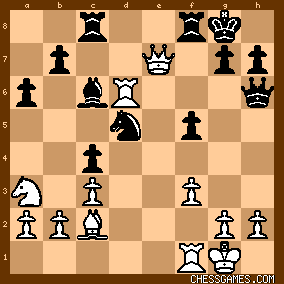
click for larger view
oblivious to <22.Qxf8!>. "A difficult position occurred at a time when the hands of the clock were dangerously near the hour, and Gunsberg , under time pressure , made some hasty moves" - 33 Game 2
Gunsberg allowed Chigorin to build up a threatening K-side attack as Black.

click for larger view
35.Rh1 Rxf3! 36. Qd2+ 37.Kg1 Bf2+!! (37...Qxb2? 38.Rf1 Qd4+ 39.Kg2=) 38.Kf1 Nd4 39.Bxd4 Qxc1+ and wins. Game 3
This was Gunsberg's first win of the match and was achieved with Black after two thumping losses. Chigorin misplayed and lost the exchange for a Pawn. The simple error contrasted starkly with his splendid combinational vision in the first two games. Game 4
Gunsberg as White, made no effort to win in a Four Knight's Opening, and a draw followed in only 13 moves. Game 5
Chigorin offered and Gunsberg accepted an Evan's Gambit. Chigorin attempted to break through in the centre but Gunsberg held onto the Pawn. Later inaccurate play by Gunsberg allowed Chigorin to claw his way back to equality. In a long Rook and Pawns endgame, Chigorin's technique let him down and he lost. The players later repeated the opening to move 12 at Hastings 1895 with Chigorin winning. Game 6
Gunsberg's inaccurate play allowed Chigorin to build up a strong K-side attack with Black in a Two Knights Defence. Chigorin broke through his opponent's defences with an inspired Rook sacrifice; 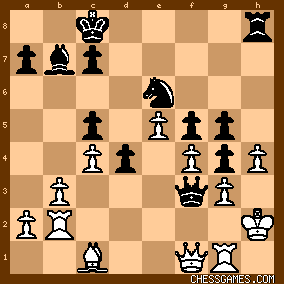
click for larger view34...Rxh4!! 35. gxh4 g3!! Game 7
Chigorin met Gunsberg's French Defence with <3.exd5>, and achieved nothing with the White pieces. In the late middle game Chigorin played inaccurately and Gunsberg could have accrued a positional advantage. Both players then lost the thread of the game and it was drawn. Game 8
This was one of Gunsberg's best games of the match. Chigorin miscalculated and allowed his opponent to tear open his King side defences. After 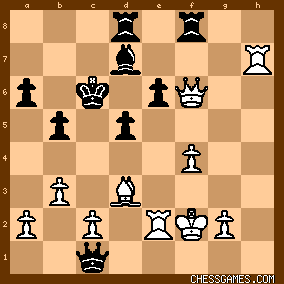
click for larger view28.Rxe6! Chigorin was caught in a mating net. Game 9
This game was a disaster for Chigorin yet it all began very well. He played an Evan's Gambit and his determination to win was shown on move 11 when he sacrificed his Bishop for his opponent's <f> Pawn and attacking chances. Later analysis established that this should have resulted in a draw, but Gunsberg made an extraordinary decision and exposed his King to a prolonged assault 
click for larger viewwith <14...Kg6?> Chigorin pursued his opponent's King across the board to the Queen-side. He seemed at a loss how to proceed. There was a three-fold repetition which was ignored and then Chigorin blundered and let Gunsberg's King escape. With the tables turned, Gunsberg's play improved considerably and with an ending in which he had a Rook, two Bishops and a Knight for his Queen he won the ending efficiently. Game 10
Gunsberg established a winning endgame only to let victory slip through his fingers due to poor technique 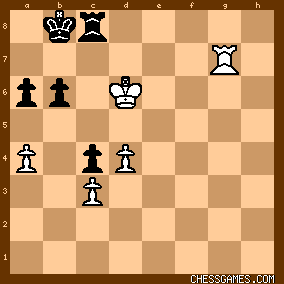
click for larger viewwith <62.d5?> instead of <62.Re7>. With <62...b5> Chigorin reached a technically drawn position. Gunsberg, apparently, wanted to be shown and his persistence paid off. After an accurate defence Chigorin suddenly made a gross blunder with 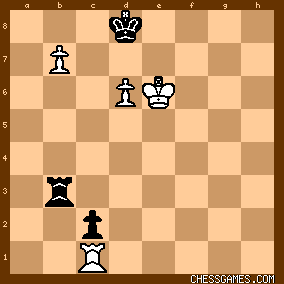
click for larger view77...Rxb7 and after <78.Rh1> he could not avoid mate. This was the second loss in a row due to a simple blunder by Chigorin. Game 11
Despite the setbacks of the previous two games, Chigorin rallied to show that his combinational ability was still intact. Gunsberg played lackadaisically and did not see the danger to his King.
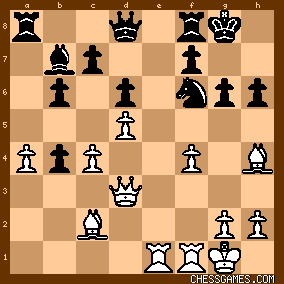
click for larger view
<24.Re6!!>
Game 12
Gunsberg played another good attacking game. Chigorin allowed his opponent's Queen to penetrate his Q-side and weave a mating net around his King. Game 13
Gunsberg as Black in a Vienna Game, allowed his King to remain in the centre for too long. Chigorin broke through in the centre and again sacrificed his Bishop on <f7>. Although he missed some quicker finishes, the issue was never in doubt. Game 14
Chigorin defended with a Dutch defence but misplayed it very badly. He ended up two Pawns down and whilst Gunsberg could have made some better moves, he did not dissipate his advantage. Game 15
Chigorin established a significant spatial advantage against Gunsberg's Scandinavian Defence. It seemed only a matter of time until he broke through to his opponent's cramped King. Chigorin once again lost his way. 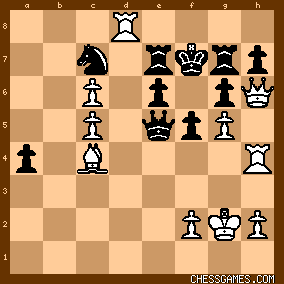
click for larger view44.Qxh7! would have won. Instead, Gunsberg was left with a winning position which he then blundered away in return and the game was drawn. Game 16
Gunsberg attempted a Pawn storm on the King-side, but lost through carelessness in the opening 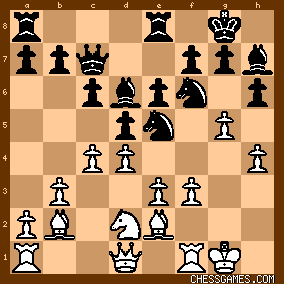
click for larger viewafter <15.c5?> (15. dxe5 =) he was rocked back by <15...Nd3>
16. Bxd3 (if 16. cxd6 Qxd6 17. Bxd3 Qg3+ 18. Kh1 Qxh4+) Game 17
Chigorin's Vienna opening yielded him no advantage and opposite coloured Bishops led to a draw. "Feb. 3. Yesterday's game in the contest between Messrs. Gunsberg and Chigorin was commenced with the Vienna Opening. Gunsberg obtained an advantage, but by somewhat relaxing his attention later on, he enabled his opponent to equalise matters, the result being a draw on the 47th move." 34 Game 18
Gunsberg played carelessly with
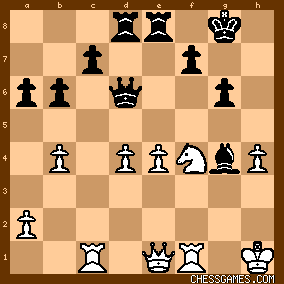
click for larger view31.Nd5? and after <31…Bf5!>, he sacrificed the exchange in the forlorn hope of some attacking chances. Chigorin made no mistake and pocketed the exchange with impunity. Game 19
Gunsberg equalised efficiently as Black in a Ruy Lopez. Having little prospect of any advantage, Chigorin conceded a draw in 22 moves. This was the second shortest game of the match, but it was to be followed by four decisive and hard-fought games. Game 20
Chigorin, defending a Ruy Lopez, created a tremendous attack on the K-side in the late middle game. Transferring his heavy pieces across from the Q-side with great skill, he finished in splendid combinational fashion. Game 21
Chigorin blundered with <25.Qg4?> 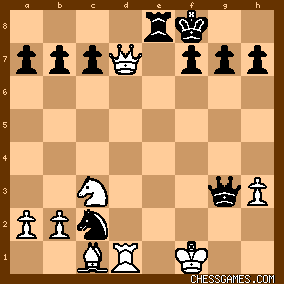
click for larger viewleaving Gunsberg with a much superior ending after <25...Re1!>. In the endgame, he made a gross error and lost quickly. Game 22
Chigorin equalised with the Two Knight's defence and then began to develop a mild initiative on the King-side. Gunsberg, completely lost the thread of the game and Chigorin's clever play, especially with his Knight, won the game. Game 23
"The 23rd game in the contest between Messrs. Gunsberg and Chigorin has once more placed the two players on an equality. They now stand nine wins each out of the necessary ten. In yesterday's game Chigorin had the move, and a Centre Gambit resulted. Gunsberg obtained an advantage in the middle came by clever and well-directed play, and, maintaining his superiority, he won on the 41st move. The enthusiasm here is unbounded, and it is safe to say that no previous chess match has ever caused such excitement." 35 'I thoroughly know that opening,' said Gunsberg afterwards, 'for I played it frequently in the Hamburg tournament of 1885, and first adopted the defence I need against Chigorin in a game I believe against Johannes Minckwitz, played in that tournament (J Minckwitz vs Gunsberg, 1885). I knew at once that I would either win or draw the game.' Chigorin in his turn had indeed at this decisive moment fallen a victim to one of the rules governing the match that each opening should not be played more than twice by each player. Being compelled to choose a fresh opening he had selected one about which his opponent for once knew more than he did. The game had hardly proceeded five or six moves when Chigorin must have discovered by the rapid and confident play of his opponent that he had made a mistake. Gunsberg got the attack in hand, and soon drove all the first player's pieces back to the eighth rank. Chigorin had, as usual in the opening, castled on the Queen's side, and was subjected to an attack in that quarter. Matters soon assumed a critical aspect, and the spectators thought a speedy termination in Black's favour not unlikely. Chigorin, however, defended well, and Gunsberg probably still played under the restraint imposed upon him by the state of his score. Between about the 25 and 35th move it seemed that, although Gunsberg had somewhat the better position, his opponent might yet be able to equalise matters, but a mistake on the part of the Russian in playing his Knight to B2 instead of to K3 deprived him of his last chance, and by a few clever and well-directed moves Gunsberg knocked the ground from his feet, thereby scoring his ninth win, and at the same time saving the match. It must be admitted here that even Chigorin's backers joined in the general congratulations which rewarded Gunsberg for his victory, for they admired the pluck displayed in the game, and honoured the player who could hold his own so evenly.." 36 "The next question was what was to be done now. The committee of the club and those members who had liberally contributed towards this match felt it would be absurd indeed to stake the issue of a great match on a single game when 23 games had been played between the same players with an even score. The committee met on Tuesday, and asked Gunsberg what his views were. Gunsberg replied that he would like to play out the match, but as it would be unfair that the loser, after having made such a good fight, should sacrifice everything over one game, he proposed the committee should offer a sum of 100 dollars to the loser of the game. The committee, however, intimated that they would prefer the match to be drawn, although they declared their willingness to accept Gunsberg's proposal in a modified form, in case Chigorin refused to agree to draw. Upon this Gunsberg placed himself unreservedly in the hands of the committee. Chigorin did not put in an appearance till nearly 2 o'clock on Wednesday — the time for resuming play— when Senor Golmayo acquainted him with the desire of the committee, Chigorin offered to play three or five games to decide the match, but Gunsberg said he would either play the final game or draw the match, but would not on any account prolong the contest. After this declaration, Chigorin agreed to the request of the committee, and the match was abandoned as a draw. " 37 Aftermath
Gunsberg was keen to maintain his momentum and establish his position as a leading player. He made energetic attempts to secure another match against another leading player. "Dr. Tarrasch is unable, on account of other business engagements, to accept the invitation of the Havana Club to play Herr Steinitz. A match between Herr Steinitz and Mr. Gunsberg will be played at New York in December." 38 "THE HAVANA CHESS CLUB AND MR.GUNSBERG.
Mr. Gunsberg telegraphed to the Havana Chess Club on October 5 asking that a match should be arranged there between himself and Mr. Blackburne in January. The Havana Club, however, declined to comply with this request." 39 He was able to secure an opportunity to play for the world championship "THE CHAMPIONSHIP.—GUNSBERG V. STEINITZ.
"Further details are now to hand respecting the proposed match between Gunsberg and Steinitz. It appears that on Mr. Gunsberg's arrival in New York, from Havana, great enthusiasm was manifested towards him by the local players, and a proposal was at once made that he should fight a match with Steinitz. Gunsberg, however, was very anxious to have another trial of strength with Chigorin and this, meeting the approval of the New York players, the Manhattan Club, of that city, at once started preparations for the contest. The proposed conditions were a match of live games up for the same stakes as in their previous encounter, with the addition of a substantial purse to cover the expenses—this latter being subscribed by the local players, who came forward with most liberal donations. On Chigorin's arrival in New York he was approached on the subject when, much to the surprise and disappointment of everyone, he refused to play again, on the ground that he intended to arrange a match on a large scale at St. Petersburg. The directors of the Manhattan Chess Club thereupon met and decided to promote a match between Gunsberg and Steinitz, to take place as soon as possible. Mr. Gunsberg proposed to start play on 1st May, he desiring a short rest and wishing to spend a few weeks in England. Steinitz could not agree to this date, as it would interfere with his other engagements, and the start was therefore postponed until the autumn. A committee of the Manhattan Club was appointed and entrusted with the task of carrying out the necessary arrangements, and they are maKing active progress with their work. Already large sums have been subscribed towards the stakes, and Mr. Steinitz has given his assent to the proposal. Great things are expected of the contest, which will be one of the most interesting Chess struggles of modern times. The Yankee enthusiasm has been thoroughly aroused, and no doubts are entertained as to their ability to bring the match to an issue." 40 Steinitz played Gunsberg for the world title - Steinitz - Gunsberg World Championship Match (1890) This was Gunsberg's swan-song. The 1890's were to be the decade which marked the emergence of Seigbert Tarrasch and Emmanual Lasker. Gunsberg could not keep up with these two great players. At 6th German Congress, Breslau, July 15th - 28th 1889, then at the 6th British Congress, Manchester, August 25th - September 8th 1890, Tarrasch was far ahead of his rivals including Gunsberg, Mason and Blackburne. As for Lasker, he demolished the leading British masters who would play him. The contenders of the previous decade had been overtaken: Lasker - Bird (1890), Lasker - Blackburne (1892) and Lasker - Bird (1892) Notes:
1 <"The book of the Sixth American Chess Congress: containing the games of the international chess tournament held at New York in 1889.> Edited by W. Steinitz (1891), Committee report page, xii
2 "Shields Daily Gazette" - Monday 17th June 1889, p.2. The quote is from "Hamlet, Prince of Denmark. 3 Columbia Chess Chronicle, Vol.5, October 15th 1889, No.17, p.75. 4 The Argus (Melbourne, Victoria, Australia) Friday 21st Game 1 - February 1890, p.5. 5 <"José Raúl Capablanca: A Chess Biography">, Miguel A. Sánchez, p.39. 6 http://www.chessmetrics.com/cm/CM2/... 7 http://www.edochess.ca/players/p417...
8 Morning Post - Monday 10th October 1887, p. 2. 9 Sheffield Evening Telegraph - Monday 20th June 1887, p. 2. 10 Bristol Mercury - Tuesday 21st August 1888, p.8. 11 <"The book of the Sixth American Chess Congress: containing the games of the international chess tournament held at New York in 1889.> Edited by W. Steinitz (1891), Committee report page, xii 12 <"The book of the Sixth American Chess Congress: containing the games of the international chess tournament held at New York in 1889.> Edited by W. Steinitz (1891), Committee report page, xx. 13 <"The book of the Sixth American Chess Congress: containing the games of the international chess tournament held at New York in 1889.> Edited by W. Steinitz (1891), Committee report page, xxi 14 Letter from Steinitz to the publishers "George Routledge and Son, April 3rd 1890. Quoted in <"The Steinitz Papers: Letters and Documents of the First World Chess Champion">, p.115. 15 <"The book of the Sixth American Chess Congress: containing the games of the international chess tournament held at New York in 1889.> Edited by W. Steinitz (1891), Committee report, page xxiii 16 <"The book of the Sixth American Chess Congress: containing the games of the international chess tournament held at New York in 1889.> Edited by W. Steinitz (1891), Committee report page, xx. 17 Morning Post - Monday 17th June 1889, p.2.
18 "Shields Daily Gazette" - Monday 17th June 1889, p.2. 19 Nottinghamshire Guardian - Saturday 5th October 1889, p.3. 20 The Brooklyn Daily Eagle (N.Y), 13th October 1889, p.14. 21 The Chess Player's Chronicle - Saturday, 19th October 1889. p89. 22 New York Times - Saturday, November 9th, 1889, p.3. 23 The Argus (Melbourne, Victoria, Australia) Friday 21st Game 1 - February 1890, p.5. 24 The British Chess Magazine, January 1890, p.45. 25 Columbia Chess Chronicle, Vol.5, October 15th 1889, No.17, p.75. 26 The British Chess Magazine, February 1890, p.112. 27 Canterbury Journal, Kentish Times and Farmers' Gazette - Saturday 30th November 1889, p.6. 28 Belfast News-Letter - Saturday 28th December 1889, p.7. 29 Morning Post - Thursday 23rd January 1890, p.5. 30 Belfast News-Letter - Thursday 27th February 1890, p.3. 31 Columbia Chess Chronicle, Vol.5, January 15 1890, No.12 & 13, p.142 and 143. 32 Columbia Chess Chronicle, Vol.5, Game 1 - February 1st 1890, No.14. p.162 – 163. 33 The Scotsman - Saturday 4th January 1890.
34 Morning Post - Tuesday 4th February 1890, p.3. 35 Morning Post - Wednesday 19th February 1890, p.4. 36 South Australian Chronicle (Adelaide, South Australia, Saturday 3rd May 1890, p.16. 37 South Australian Chronicle (Adelaide, South Australia, Saturday 3rd May 1890, p.16. 38 York Herald - Tuesday 7th October 1890, p.4. 39 Manchester Evening News - Thursday 16th October 1890, p.2. 40 The Chess Player's Chronicle - Saturday, 22nd March 1890. p.97. A contemporary match book was published: "Match: Gunsberg - Tschigorin (Paris, N.Preti) according to The British Chess Magazine, August 1890, p.329. Acknowledgment User: zanzibar for editorial suggestions, and User: OhioChessFan for proof reading and improving the text. Games cloned from User: keypusher 's original collection with his agreement. I have, however, altered several of the dates to match my own sources. <"From this day to the ending of the world,
But we in it shall be remembered-
We few, we happy few, we band of brothers;
For he to-day that sheds his blood with me
Shall be my brother; be he ne'er so vile,
This day shall gentle his condition;
And gentlemen in England now-a-bed
Shall think themselves accurs'd they were not here,And hold their manhoods cheap whiles any speaks
That fought with us upon Saint Crispin's day.">
― William Shakespeare, Henry V
"Chess is above all, a fight!" — Emanuel Lasker Below is the acrostic poem by Mrs T.B. Rowland:
Tears now we sadly shed apart,
How keenly has death's sudden dart
E'en pierced a kingdom's loyal heart.
Dark lies the heavy gloomy pall
Upon our royal bower,
Kings, queens, and nations bow their heads,
Each mourn for England's flower.
Oh! God, to her speak peace divine,
For now no voice can soothe but thine.
Ah, why untimely snatched away,
Loved Prince – alas, we sigh –
Before thy sun its zenith reached
Athwart the noonday sky.
Noble in heart, in deed, and will,
Years hence thy name we'll cherish still.
That poem was published on pages 140-141 of Chess Fruits (Dublin, 1884) The 20-40-40 rule in chess is a rule for players rated below 2000 that states 20% of your study should be dedicated to openings, 40% to the middlegame, and 40% to the endgame. "Prepare for the worst but hope for the best." ― The Wondrous Tale of Alroy by Benjamin Disraeli, published in 1833 Virgil's Aeneid: "Fortune favors the bold." Galatians 6:7 in the Bible "Be not deceived, God is not mocked: for whatsoever a man soweth, that shall he also reap." "those who live in glass houses shouldn't throw stones" is often cited as originating in Chaucer's Troilus and Criseyde written in 1385. "It is the part of a wise man to keep himself today for tomorrow, and not venture all his eggs in one basket." The phrase appeared in Don Quixote, by Miguel de Cervantes, in 1615. "I take things as they come and find that patience and persistence tend to win out in the end." ― Paul Kane "Patience, persistence, and perspiration make an unbeatable combination for success." ― Napoleon Hill Actions speak louder than words
"Unless you try to do something beyond what you have already mastered, you will never grow." ― Ralph Waldo Emerson "Be kind, for everyone you meet is fighting a hard battle." ― Plato "Do the difficult things while they are easy and do the great things while they are small. A journey of a thousand miles must begin with a single step." ― Lao Tzu A Windsong by Ray Paquette (1984):
As you set sail for new horizons
May a brisk fair wind be with you
May your journey provide that mixture of
Joy, contentment, love and excitement
That gives rise to zestful anticipation
Of new adventures together.
May you cheerfully weather
the unavoidable storms together
And steer as clear of all obstacles
As the currents allow
May God Bless and keep you
Bon Voyage
"One of the nice things about surrendering to the fact that life isn't fair is that it keeps us from feeling sorry for ourselves by encouraging us to do the very best we can with what we have." ― Richard Carlson ~~~~~~~~~~~~
The Game of Chess
by Alan Hall
A poem about chess? Well, there's an idea.
Hopefully this one will be one to hear.
What of the pieces? I'll take them in turn.
And try to tell how each it's living does earn.
The pawns can move straight or diagonally
Depending on whether it's taking, you see.
Next comes the bishop – it moves across,
Of diagonals it is the boss.
Then there is the knight – some call it a horse
From its siblings it pursues a quite different
course.
One square diagonally, then one straight.
It's so crafty, you start to hate
It when you've lost to its smothered mate.
Stronger still than all these is rook.
If you've got two of them, you're in luck.
The you may even beat the might queen.
A rook and bishop combined, she reigns
supreme.
Last, but not least, is the humble king.
When you've mated him, you can sing.
Well, that's all the pieces that make this game
of chess.
The playing of which can bring happiness.
"The Game of Chess" written by Alan Hall and printed in CHESS POST, Volume 33, No. 3 (or the June 1995 issue).
| 


